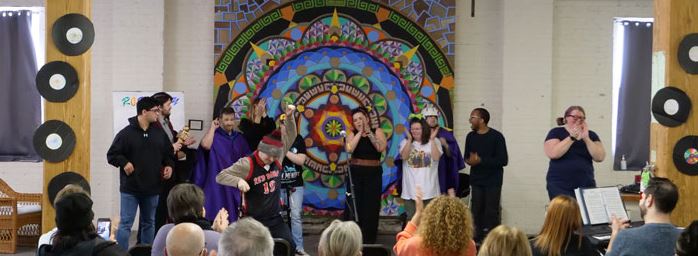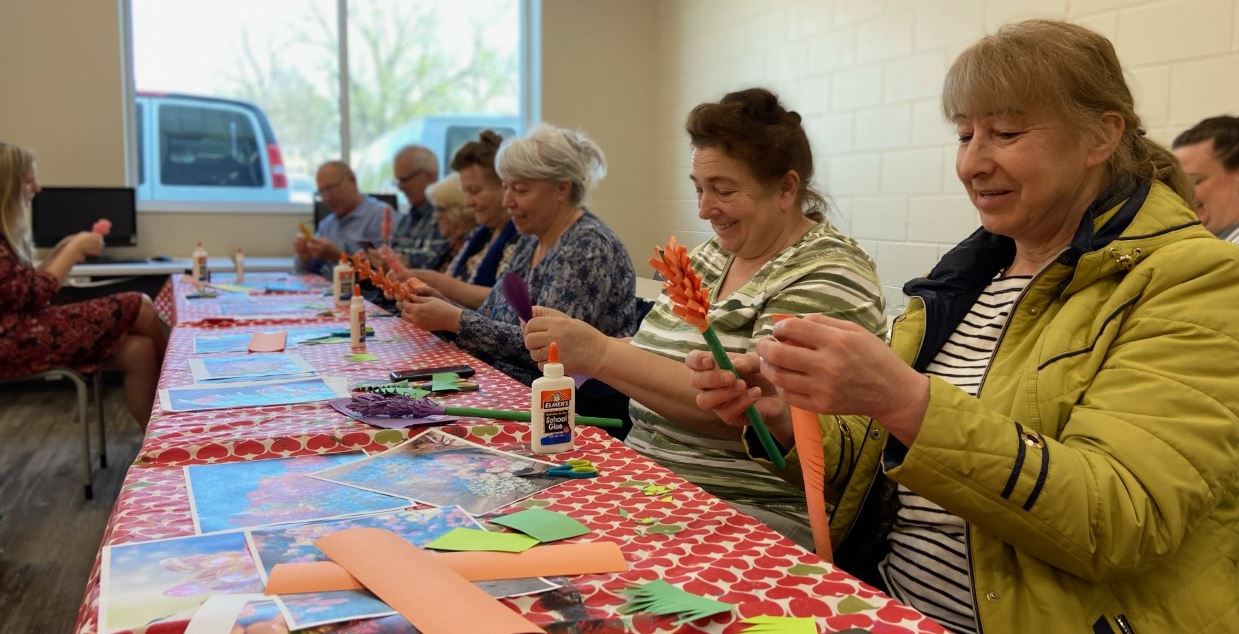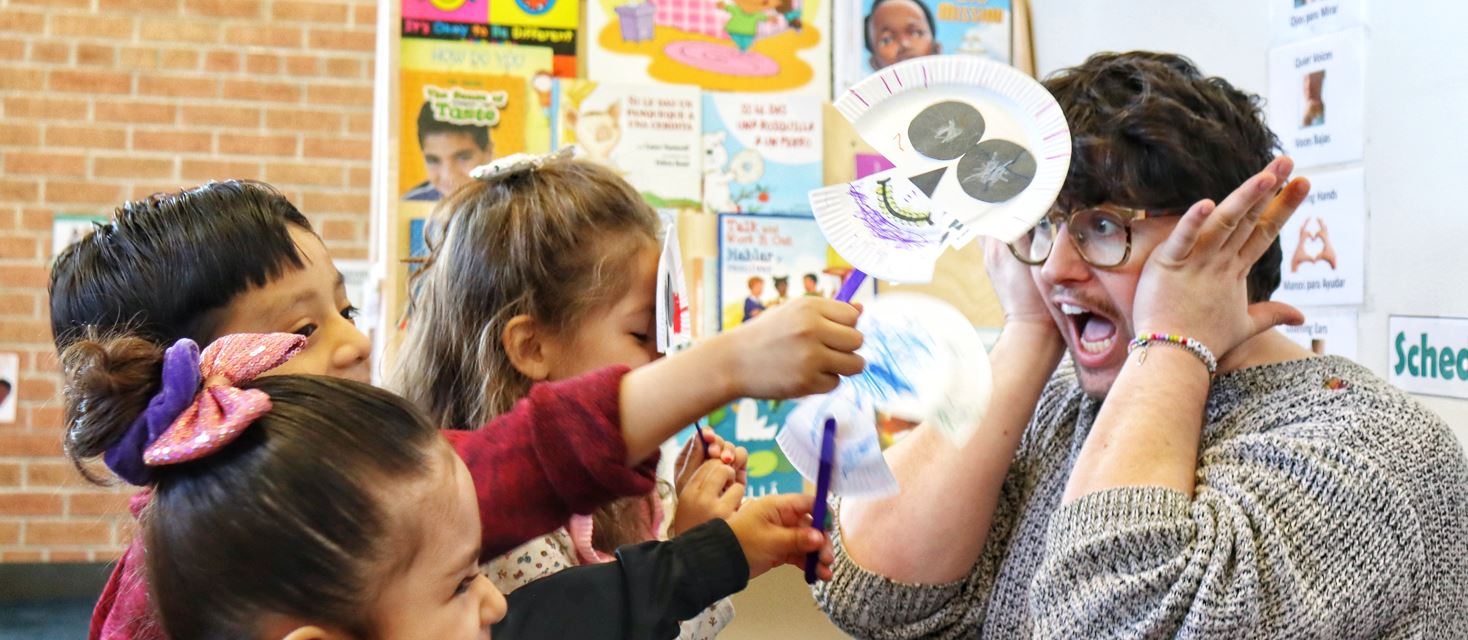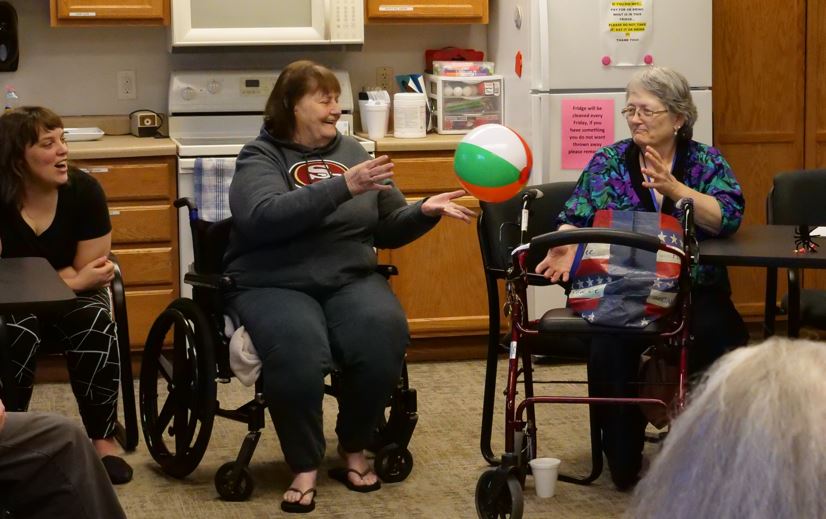Applications opening December 15 for the Holland Community Opera Fellowship!
26/27 Holland Community Opera Fellowship
Open to Teaching Artists of Any Discipline who Connect to Opera
Teaching Artists of any discipline who have a connection to opera and are committed to engaging with the community are encouraged to apply for the Holland Community Opera Fellowship.
Launched in 2017, the Holland Community Opera Fellowship (HCOF) leads the opera field in civic practice, building deep relationships outside of the performance venues. Our team engages with the Omaha community each season, bringing artistry and civic practice skills to a variety of long-term and short-term co-created community-based programs. Programming is focused on creativity and inspiration with the art form of opera as a toolbox, not teaching opera. The elements of opera (drama, word, art, movement and music) are at the heart of all of our programming.
The primary qualities of a successful candidate include a strong interest in serving the community through the arts, at least 1-2 years of teaching artist experience, a strong connection to opera, a team orientated work style, and a collaborative and creative thinker. Opera Omaha values staff diversity that represents Omaha’s diverse communities and seeks candidates who reflect this value.
This full-time position will be for the 26/27 season.

Application Guidelines
The Application for the Holland Community Opera Fellowship is unique and made up of multiple elements. The goal of the Fellowship application is to get a sense of you as a teaching artist and person. Applicants are encouraged to review the following guidelines and FAQs closely before applying.
A full application consists of the following parts: Your Resume, Short Answer Questions, and Artistic Work Samples. All of these are submitted via the online application form.
Your Resume
Your resume should include:
-Work Experience, Volunteer Experience and/or Experience Working in and with Community
-Teaching or Teaching Artist Experience
-Education and Training
-Artistic Training and Experience
-Language Skills
Please be sure your resume highlights:
-Experience developing and teaching arts programming for community participants including adults, youth, and/or families.
-Experience working with the populations served by HCOF including adults, children ages 2-18 years, individuals with disabilities, seniors, immigrants and refugee populations, incarcerated youth, and/or adults experiencing homelessness.
Your Short Answer Questions
Please answer the following questions with a short response. One document should be uploaded that includes your response to each of these questions. Please use no more than 250 words per question.
-
Describe the specific skills you have that make you an effective team member. How do these skills help you succeed in a collaborative, professional setting?
-
Why is making art in, with, and for the community important to you? Include at least one example of how you have demonstrated this.
-
Tell us about your interest in doing this type of work at an opera company. Be sure to include how your work connects to opera.
- One of our core program partners is Intercultural Senior Center. Intercultural Senior Center is a community center for older adults ages 50 and older, with on-site activities, nutrition, education, exercise, and cultural events. The seniors are from different cultures and countries and may include immigrant and refugee populations. Keeping this population in mind, how would you utilize your skills to engage the seniors in a 90-minute, community based arts workshop?
Your Artistic Work Samples
Please submit no more than three artist work samples within one document. Please choose artistic samples that represent you and help us understand your artistry. Artistic Work samples should include and illustrate:
1) Your work as a teaching artist in the community.
2) Your work as an artist.
Samples may include text, website links, PDFs, photographs, and/or video files. Please ensure any links included are accessible, able to be shared, and easily viewed. If the sample does not have a description provided, please feel free to add a short sentence or two to provide context. All work should be clearly labeled and attributed.
Please note: If more than three artistic work samples are submitted, only the first three will be reviewed and considered.

Frequently Asked Questions

What should my resume include?
Your resume should include things like your work and teaching experience, education and training, artistic training and experience, and language skills. We could you to highlight your experiences with the populations we serve including adults, children ages 2-18, individuals with disabilities, seniors, immigrants and refugees, youth who are incarcerated and adults experiencing homelessness.
I don’t have a degree. Would my application be considered?
Yes, experience will be considered in lieu of academic credentials.
How long is a Fellowship contract?
This full-time position is for the 2026-2027 season.
Do I need to live in Omaha for this position?
Yes, Fellows are expected to live in the area while on contract. Most Fellowship programming will occur at community partner sites across the Omaha metro area. Programming is primarily in-person, starting in August 2026 and ending in May 2027.
What does a typical week look like in the Fellowship?
In a given week, Fellows will:
- Plan community-based arts programming
- Participate in staff & community partner meetings
- Provide programming in the community—programming can be anywhere from a one-time event, weekly or monthly sessions, to a year-long project
- Take part in reflective practice as they reflect and report on their work and experience.
- Take part in professional training (non-artistic)
- Deepen their civic practice and community engagement skills.
- Deepen their creative practice, which may include time with artist mentors, or individual studio or practice time (weekly)
- Share their artistry with the community. This has included concerts, performance poetry and recordings, and may look different each season.
Who are some of the community partners I’d be working with as a Fellow?
The Holland Community Opera Fellowship (HCOF) collaborates with more than a dozen partners across the Omaha metro area. HCOF’s priority is to help community partners reach their goals as they work to provide a better quality of life for their communities and serve those who may have limited access to arts experience and programming. Programming is focused on creativity and inspiration with the art form of opera as a toolbox, not teaching opera.
Some examples of co-created programming with partners in the last year include:
- Music and acting workshops with participants from Quality Living Inc.(QLI) and Ollie Webb Center, Inc. QLI is a residential rehabilitation facility for individuals with traumatic brain and spinal cord injuries, and Ollie Webb’s Art of the Imagination Program serves adults with disabilities.
- Creativity and writing workshops with residents at MICAH House. MICAH House is an emergency housing shelter that serves families and women.
- Creativity and music workshops to support connection with members of the Intercultural Senior Center. Intercultural Senior Center serves hundreds of seniors across Omaha, including those from immigrant and refugee communities. You can view the ISC Songbook project created with HCOF Fellows in Fall 2020 on our blog.
- Creative storytime and art creation focused on celebrating culture and bilingual abilities with young children at the Learning Community Center of South Omaha.

Do Fellows work mostly independently or as a team?
Fellows primarily work as a team. All programming in the Fellowship is facilitated by two or more Fellows. In addition, they work together to develop curriculum and activities informed by community partners. Fellows work closely with the Community Opera Fellowship Manager evaluating and reflecting on the programs and day-to-day activities in the Fellowship. The ideal candidate has a strong sense of teamwork and desire to collaborate with other artists.
I’m not an opera singer. What might support for my artistry look like?
Opera Omaha will work with each Fellow to explore ways to support their artistic growth and process. This may include finding opportunities to showcase their art through Opera Omaha programming, or connecting with local and regional artists and mentors across opera and/or other artistic fields.
I’m a singer. Are there mainstage performance opportunities?
Because the role of the Fellow is to be a resource and provide a consistent, meaningful presence in the community, Fellows are not scheduled in mainstage productions. Opportunities for performances vary each year, but have regularly included performing in Opera Outdoors, Gallery 1516 recitals, small development and engagement events, and more!
What is the compensation?
Fellows are full time staff members with a salary of $43,260/year. Fellows also receive benefits including medical, dental and life insurance, 403b retirement savings plan, flexible time off and holiday pay, and a professional development stipend.
Will there be opportunities for training and professional development?
Opera Omaha provides professional development opportunities for Fellows in order to support their growth as well-rounded, civically engaged artists. This begins with an intensive and intentional onboarding process in August and continues throughout the year with ongoing training opportunities. We work to set Fellows up for success in their professional careers and as they work in our community.
Training and Resources
Expanded training for our Fellows is necessary to better prepare them to work with a wide range of populations in the community. This includes, but is not limited to, utilizing training programs outside of the arts including topics such as healthcare sensitivity, trauma informed models, cultural competence, person first language, reflective practice and civic practice in addition to specialized training from our community partners.
Professional Development
Fellows receive a $5,000 professional development stipend per season to use towards continuing education, artistic development, and/or professional development. Fellows work with the Community Opera Fellowship Manager to create and implement a Professional Development Plan that is unique to their needs and goals. The use of funds must be approved and connected to the Professional Development Plan. Funds can be used for things such as classes and trainings, coachings or lessons, seminars, conferences, and travel and housing to and from said engagements.
Artistic Development
Artistic Training opportunities are developed based on the needs of Fellows and may include coachings with Opera Omaha's Head of Music, sessions with visiting guest artists, and connecting with artists and mentors across the opera field or other organizations here in Omaha.
What does a teaching artist do after their time as a Holland Community Opera Fellow?
Each Fellow has their own unique experience after their time with us. A few examples of next steps include accepting a position as a college level faculty, working as a teaching artist in their hometown, performing roles across the country with varying arts and opera organizations, and pursuing a graduate degree. The Fellowship does not place individuals in future roles or guarantee any future employment after a contract ends.
What is Civic Practice?
Civic practice draws on opera’s authentic creative assets to address public priorities and community needs. Projects are co-created with community partners or participants focusing creative practice on partners and participants' self defined needs.
We highly recommend reading Opera America’s “An Introduction to Civic Practice”.
What are Fellow alumni saying?
"Getting to be a fellow has helped me learn more about my art, collaborate more deeply with other artists, and even become more connected with the artist and writer I want to be in the future.”
—Fernando Antonio Montejano, Holland Community Opera Fellow 2020-2023
"Working with the Intercultural Senior Center has been one of my favorite memories. We explored conducting and it was so fun to see the seniors be curious and play!"
—Alejandra Sandoval-Montañez, Holland Community Opera Fellow, 2023-2025
"I really learned that my passion for community engagement can work on a professional level and be at the foundation of everything I do. The Fellowship really instilled that I can be committed to that no matter what avenue I'm in - performing, directing, or teaching."
—Jaime Marie Webb, Holland Community Opera Fellow, 2021-2023
25/26 Holland Community Opera Fellows
Meet the TeamWhy Apply?
What makes HCOF unique?
What is HCOF?
Still have questions?
Please reach out to Community Opera Fellowship Manager, Wendy Kaiser at wkaiser@operaomaha.org or 402-885-0850.
